We've all done it.
It all starts when you get that sudden burst of motivation to make a change.
You decide you're going to start tracking your habits and stick with them for good this time.
It seems simple enough—google yourself a printable habit tracker, download it, print it out, put it up on your fridge or hang it on your wall, and boom—you'll be a new person in no time.
You start shopping around for habit tracker ideas and PDF files and...
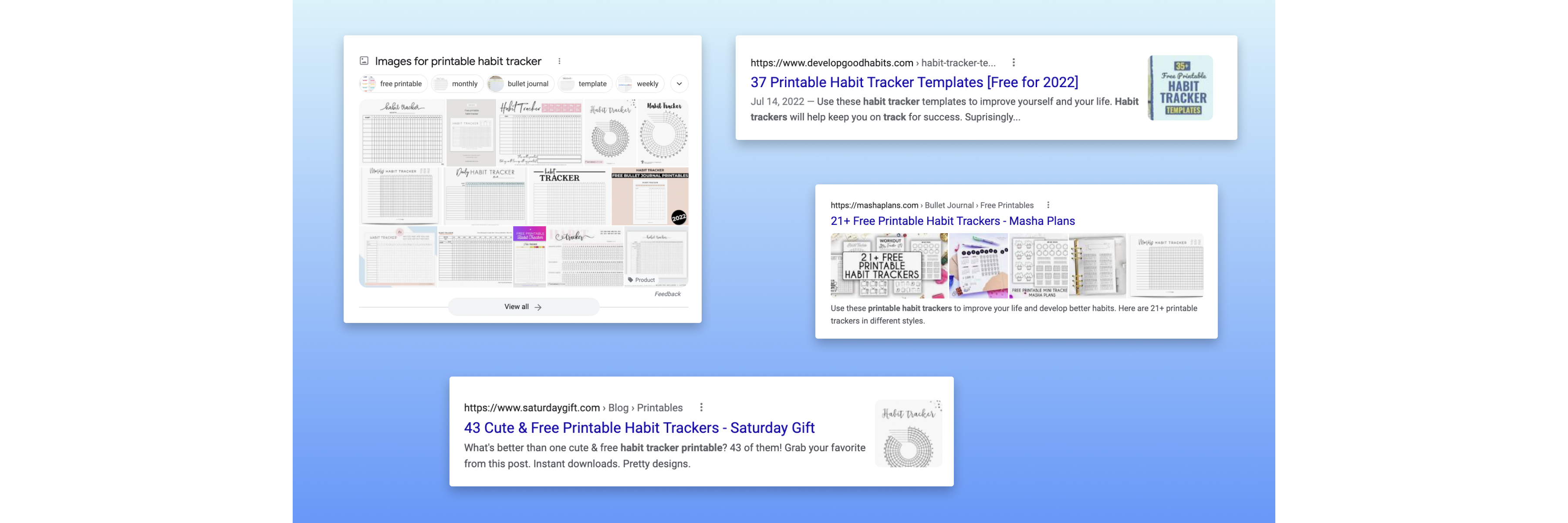
pretty quickly you start to get overwhelmed with all the different options:
... do you need one that can track daily habits, or weekly habits?
... do you want a 30-Day Habit Tracker, or a 90-Day Habit Tracker?
... how many habits should you be tracking?
... what size and color do you want?
You keep searching and searching–looking for a cute tracker with a charming design and beautiful colors that will look good on your fridge.
And before you know it, you've ended up down a rabbit hole on "colorful circle habit trackers" and realize you've wasted an hour looking for the perfect template and you are no closer to the "new you".
Well, let me stop you right there. Because here is the real problem...
Using a printable habit tracker is the WORST way to track habits in 2022.
Why? Because every single one of these habit trackers suffer from the exact same fatal flaw.
Whatever healthy habits you’re trying to build or bad habits you're trying to break—like healthy eating, making sure you drink water, cutting back on junk food, developing a workout routine, developing your mindfulness practice, or something else—a printable habit tracker will actually make you less likely to achieve consistency!
It all thanks to a mysterious phenomenon we call:
The Habit Tracking Paradox.
In 2022 there are much better solutions, designed with behavioral science and psychology in mind, that will ensure you stick with tracking long enough in order to actually experience the full benefits of habit tracking.
Take me straight to the better alternative!
The Habit Tracking Paradox and why it's a problem for printable habit trackers
This (super sophisticated) diagram explains the biggest problem with habit trackers:
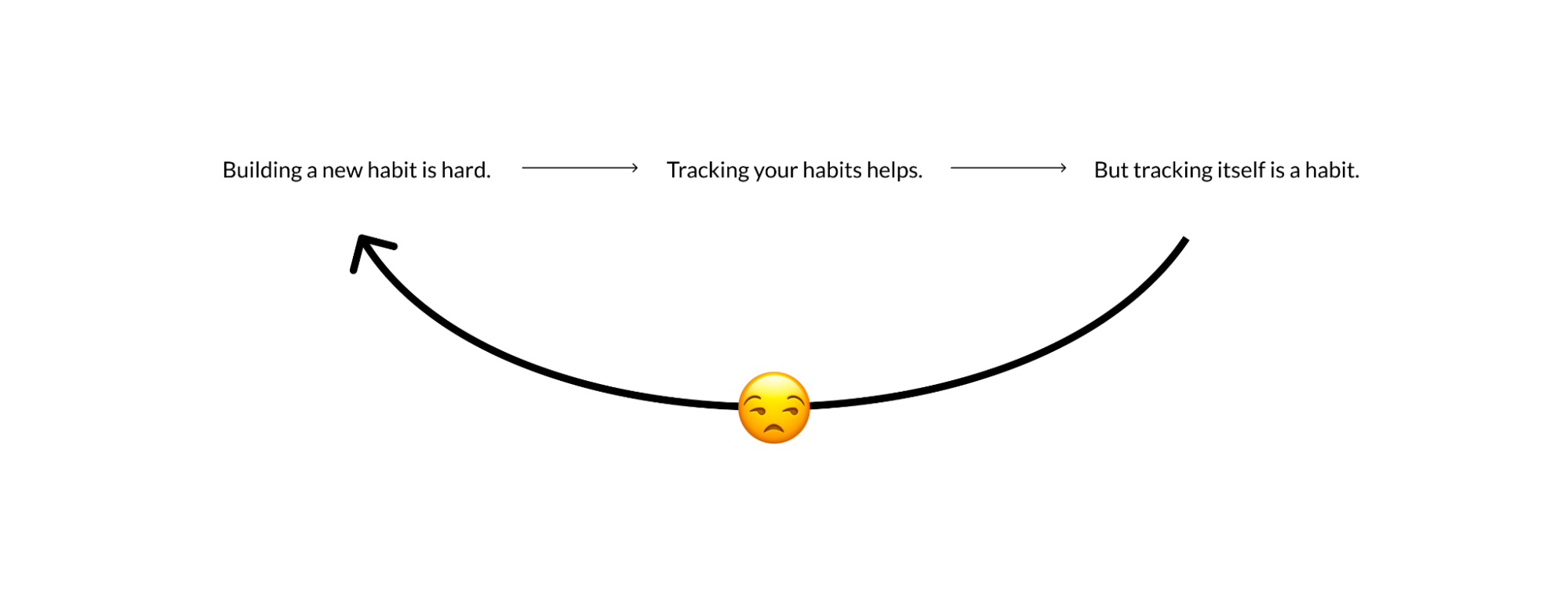
Yep, it turns out that tracking your habits… is a habit!
Building new habits is super hard, which is the whole reason you’re looking for a habit tracker in the first place, right?
But here’s the snag—when you use a habit tracker, you now also need to build the habit of habit tracking.
You’re essentially building (at least) two habits at the same time!

And if habit tracking doesn't come naturally to you, using a printable habit tracker that requires you to remember to track everyday can actually double the effort involved and make you twice as likely to fail.
And if you do happen to forget to use your tracker for whatever reason, the rest of your habits quickly fall by the wayside too.
We’ve found this out the hard way when we tried bullet journal habit trackers multiple times. We'd end up tracking for a couple days, and then falling off.
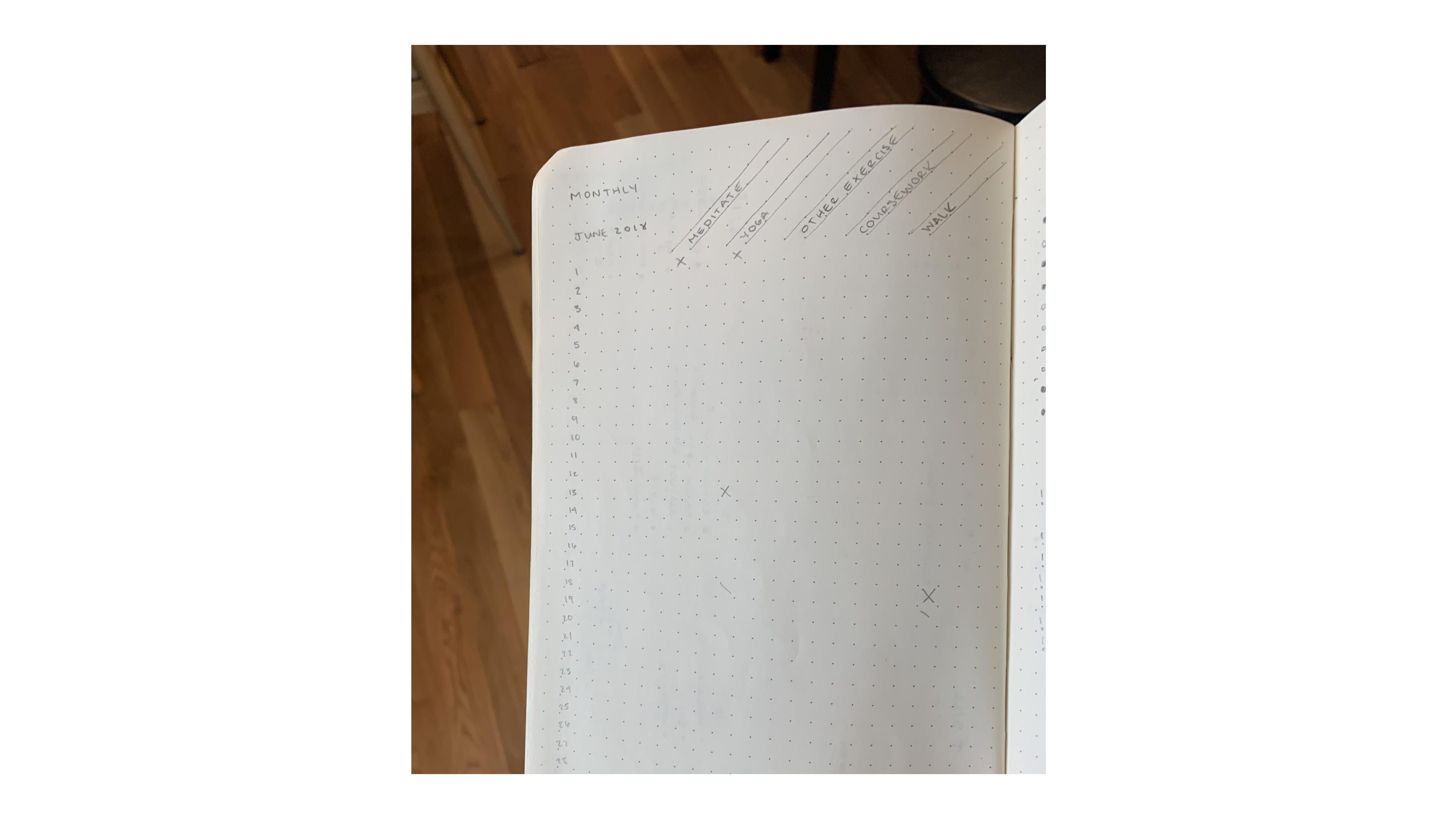
Hence: the habit tracking paradox.
The habit tracking paradox: In order to build new habits, we need to track them. But in order to track them, we need to build a habit of tracking.
Unfortunately, thanks to this habit tracking paradox, every printable habit tracker (or any paper based habit tracker for that matter) will make your life harder.
Because they all suffer from the same 4 design flaws…
4 reasons why printable habit trackers won't work for you
1. Printable habit trackers are painfully inconvenient
Let’s start with the obvious.
Printable habit trackers are a pain in the butt because… you have to print them out.
And if you want a Year-Long Habit Tracker, you'll have to print out your monthly habit tracker again, and again, and again. Times 12.
Worse still, you then have to carry your tracker with you everywhere.
You can’t tick off your workout habit when you leave the gym if your tracker is at home.
It becomes yet another thing to remember when you travel or leave the house.
It could even get lost or destroyed with no backups.
It basically just becomes yet another thing you have to keep track of.
Now, these inconveniences might not seem like a big deal at first, but when life gets particularly busy or your motivation fades, you need your habit tracker to be as easy to use as possible.
These little inconveniences all introduce extra “cognitive effort” into the process of habit tracking.
Studies consistently find that the more mental effort you have to put into something, the more likely you are to give up on it.
Neuroscientists even recently found that increasing cognitive effort undermines your brain's ability to make decisions, use willpower, and act in accordance with your long-term goals!
And when you’re doing something as hard as changing a habit—even the tiniest bit of friction can trip you up.
❌ printable habit trackers are inconvenient
2. Printable habit trackers contribute to habit overwhelm
Have you ever noticed that every printable habit tracker template has 10 or 20 rows?
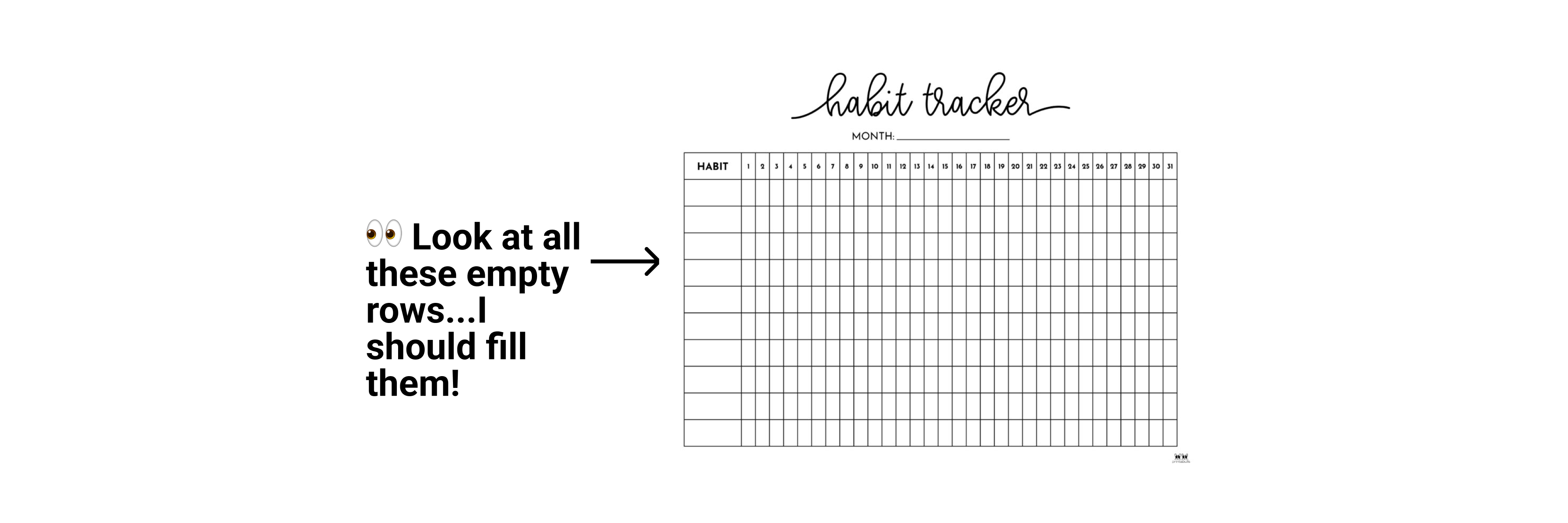
This is subconsciously sending you a message that you’re supposed to track multiple habits at once…
… which completely flies in the face of basic habit science.
Changing one habit is hard enough, nevermind seven at the same time!!
You need a habit tracker that encourages you to focus all of your energy and attention on building just one or two habits at a time.
Imagine if you just focused on building one habit per month.
You could change twelve habits within the space of a year and you’ll be much more likely to stick with them for good than if you had tried to build the same twelve all at the same time.
Building your habits up slowly and intentionally pays off dramatically in the long run.
❌ printable habit trackers are inconvenient
❌ printable habit trackers are overwhelming
3. Printable habit trackers are subtly demotivating
Neuroscience also has a bone to pick with printable habit trackers.
One of the major revelations over the past decade or so is just how important the neurochemical “dopamine” is when it comes to how motivated you feel.
Many recent studies have found that one of the best ways to keep your dopamine levels high—and thus your motivation—is to feel a sense of progress over the long run.
(Fortunately there are some cool ways a digital habit tracker can spike dopamine, more on this in a moment!)
When you use a paper habit tracker, it can be hard to see all of your hard work accumulating over time:
- It doesn’t give you an easy way to see how well you’re doing over many weeks and months.
- There are no fancy metrics or reports telling you exactly how well you’re doing at a glance.
- You start with a blank slate every month or every time you need to reprint your tracker.
When you use a printable habit tracker, your brain misses out on the long-term feelings of progress that it needs to stay motivated over many months and years.
❌ printable habit trackers are inconvenient
❌ printable habit trackers encourage overwhelm
❌ printable habit trackers are demotivating
And finally…
4. Printable habit trackers make you overly focused on streaks
The last downside of printable habit trackers—they can encourage the wrong behavior.
A lot of people like physical habit trackers because they get enjoyment out of marking off an "X" every time they do their habit and building a row of X's that symbolizes their streak.
Habit streaks are a good thing though, right?
Yes, except all good streaks must come to an end.
Let’s face it, most people never realistically stick to their habits perfectly every single day. Nor should we expect to. Life is busy and messy and surprising and even the best of us will miss a day here and there.
And when that happens, your chain of X's breaks. Your streak is over, and that can be demoralizing. And so habit streaks may be motivating at first, it all comes crashing down when inevitably, you miss a day.
And thus, this is the problem with habit streaks.
The truth is, every day you track increases the likelihood that you'll track the next day. In fact, this study by Linda Hagen at University of Southern California and Yikun Jiang at University of California Berkeley found that: "the single most important predictor of tracking on a certain day, by several orders of magnitude, is having tracked during the previous day".
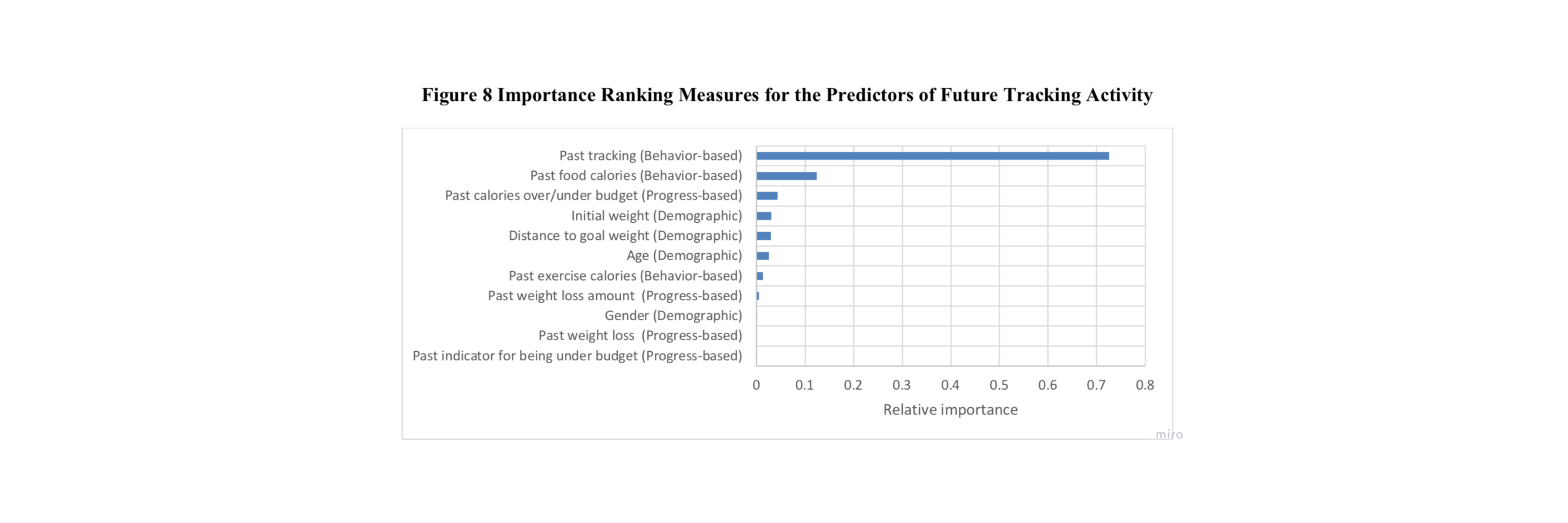
In other words, every day tracked is a step forward, even if its after a 4-day break.
Therefore, we need a habit tracker that focuses less on streaks and more on overall consistency over time.
Rather than focus on streaks—which printable habit trackers naturally encourage—you might find it preferable to follow the “Never Miss Twice” rule.
This is where you make it your goal to never miss more than one day of your habit.
So for example if you’re trying to build a meditation habit, you tell yourself that it’s okay to miss one day if something comes up.
The most important thing is making sure you get your meditation practice done on the following day.
In other words, never miss twice!
Ideally, you need a habit tracker that caters to the never miss twice strategy rather than the habit streaks strategy.
❌ printable habit trackers are inconvenient
❌ printable habit trackers encourage overwhelm
❌ printable habit trackers are demotivating
❌ printable habit trackers are inflexible
Same goes for atomic habits worksheets.
So… is there a way to enjoy the benefits of habit tracking without suffering the downsides of paper based templates or worksheets?
Yes!
How do we get around the habit tracking paradox and get the benefits of habit tracking?
The issues with printable habit trackers should not dissuade you from tracking altogether.
The truth is: tracking your habits absolutely can help you create lasting change if you do it the right way.
In fact, there's even evidence that using a habit tracker will improve your mental health and motivation.
In 2020, Marco Stojanovic and colleagues asked students to log their study patterns for six weeks.
During these weeks, the students experienced some powerful benefits:
- they were less likely to experience a bad mood or feel distracted while studying;
- they were less likely to wish they were doing something more enjoyable, and;
- the strength of their study habits improved along with their study motivation.
If you want to experience these benefits then you need to use a tracker that works by reducing friction rather than by creating it.
Specifically, you need a habit tracker that:
1. Makes tracking super easy and effortless
2. Prioritizes gradual and permanent change
3. Makes tracking fun and satisfying
4. Helps you recover from setbacks
Until recently, no such tracker existed.
But thanks to recent advances in AI and SMS technology, you can now take your tracking to a whole new level and drastically improve your odds of successful behavior change.
Say hello to...
The World’s First AI Powered Habit Tracker.
Harold the Habit Tracker is the world’s first SMS habit tracker!
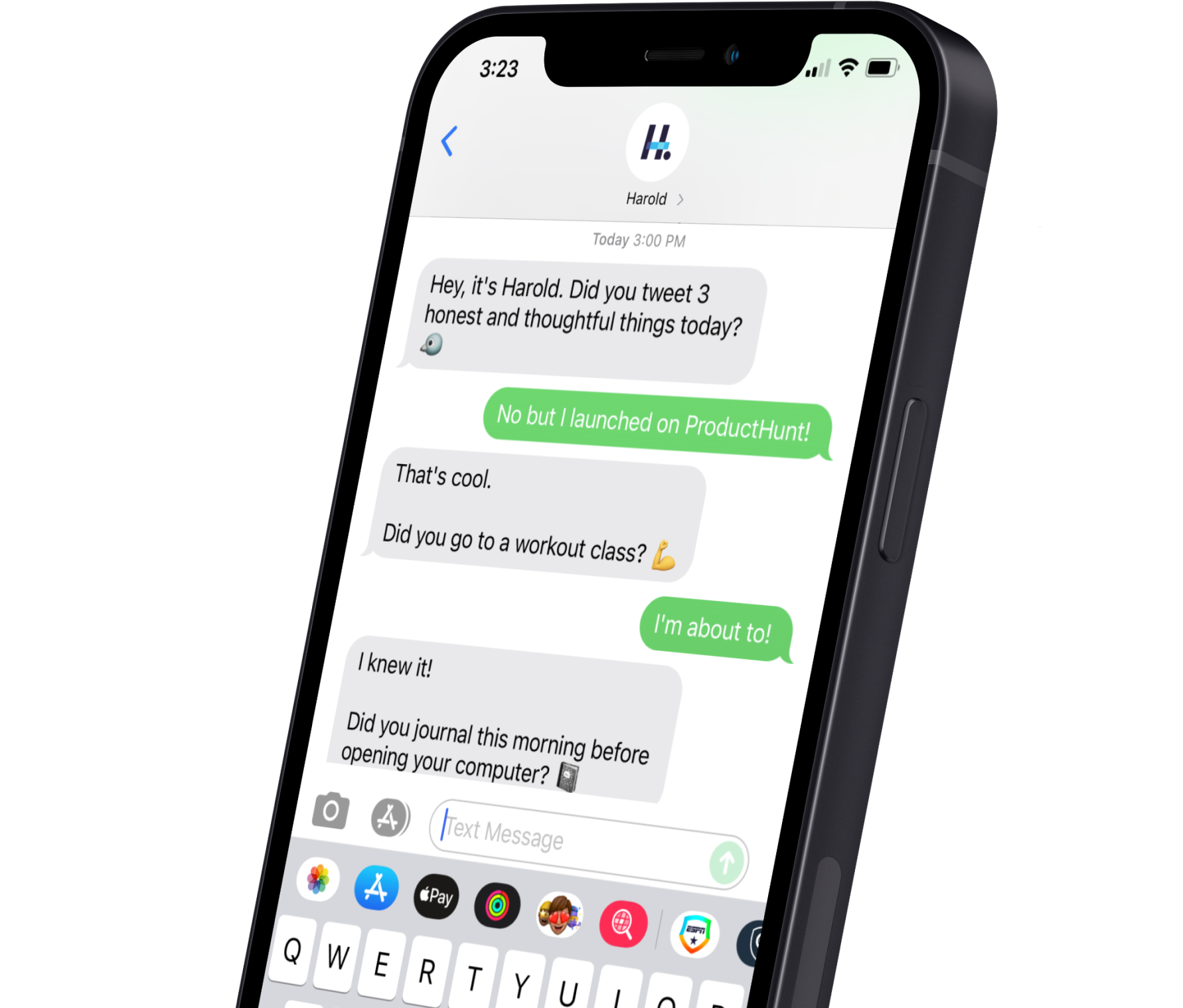
Designed specifically to be the best atomic habits habit tracker, he takes the latest SMS & AI technology and blends it with principles from the science of habit formation to streamline the habit tracking process and make it easier than ever for you to achieve consistency.
Harold helps you with your personal transformation using 4 clever strategies…
1. Harold makes habit tracking effortless
Harold solves the problem of inconvenience by being the first ever habit tracker that… talks to you.
Yes, you read that right.
You don’t need to worry about remembering to track your habits anymore.
Now your habit tracker will remember for you!
… then all you have to do is text back saying whether you did your habit or not and H will take care of the rest!
You can just focus on doing the hard work of changing your habits.
Oh, and you don’t need to print anything off and reprint a bunch of times and your tracker is always in your pocket.
Better yet, Harold is always in your inbox.
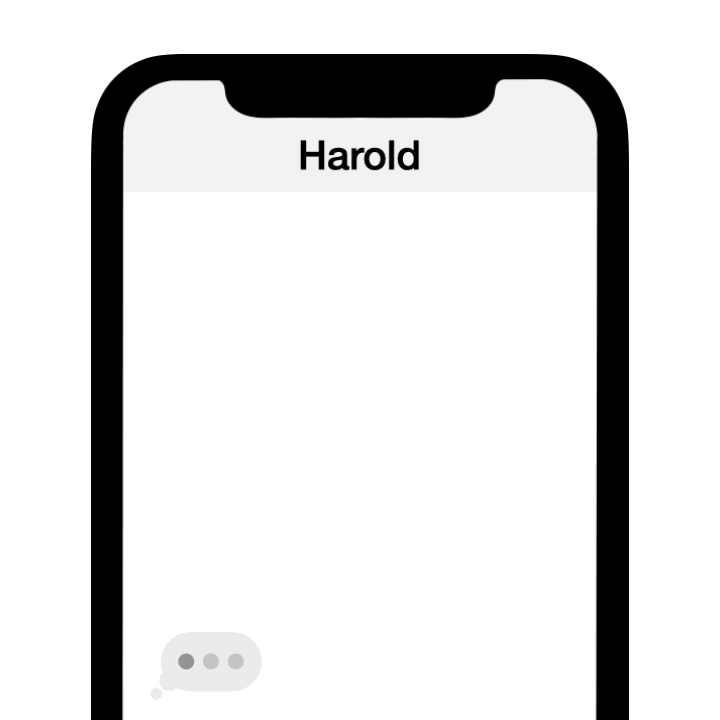
See, hundreds of habit tracking apps have tried to solve the problem of inconvenience already but they all fell into the same trap—you still have to remember to actually open the app!
Many people report losing count of how many apps they download only to then not get into the habit of using it.
You’re in and out of your inbox all day anyway so it’s waaay easier to keep on top of your tracking.
2. Harold helps you focus
With Harold, you won’t find any empty rows or white space like you do with a printable tracker or bullet journal habit tracker.
With Harold, you can only track up to 4 habits, so he helps you focus on a single or small number of habits, which behavioral science says is best for change[article]
You can even choose from a list of habits out of the box or customize your own.
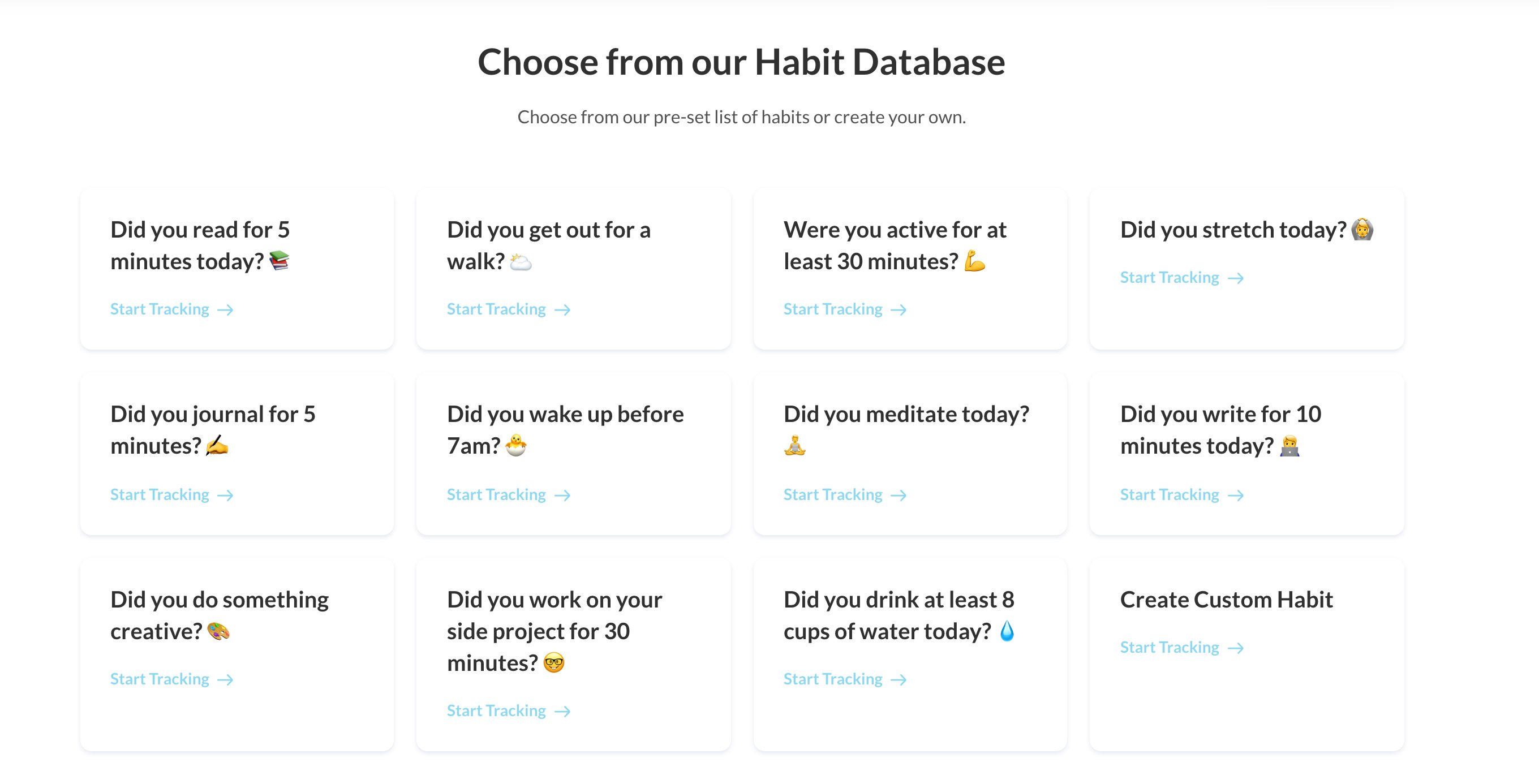
Again, the goal here is to let you focus on the hard work of changing your habits, for as long as it takes to make them stick around for good.
P.s. if you’re a total habit maverick then you can still keep track of up to 4 habits a day.
3. Harold makes it fun to become your best self
An amazing study conducted in 2022 found that people were three times more likely to achieve their long term goals when they had fun with them in the short term.
In other words, putting a little fun into your habit tracker can be a total game changer for helping you actually stick with your habits.
Harold pulls this off with a little AI magic.
Harold essentially has a mind of his own and comes up with fresh responses to keep you motivated and give you support.
(Sometimes even we’re surprised with what he comes out with!)

By comparison, paper habit trackers and even habit tracking apps are pretty anti-fun.
In fact, they subject you to the counter-principle of “habituation.”
This is where you get used to it and it becomes invisible.
In contrast, Harold’s unique responses spark novelty, which avoids habituation and is also associated with a spike of dopamine—further boosting your motivation.
Speaking of which…
4. Harold supports consistent growth over the long term
As we established above, the most important driver of long-term motivation is the feeling that you’re making progress.
That becomes incredibly easy with Harold because he’s keeping track automatically and so you can see your long term trends at a glance.
With this dopamine-progress principle in mind, Professor Andrew Huberman recommends a weekly check in to review your progress.
Harold will take care of that for you too:
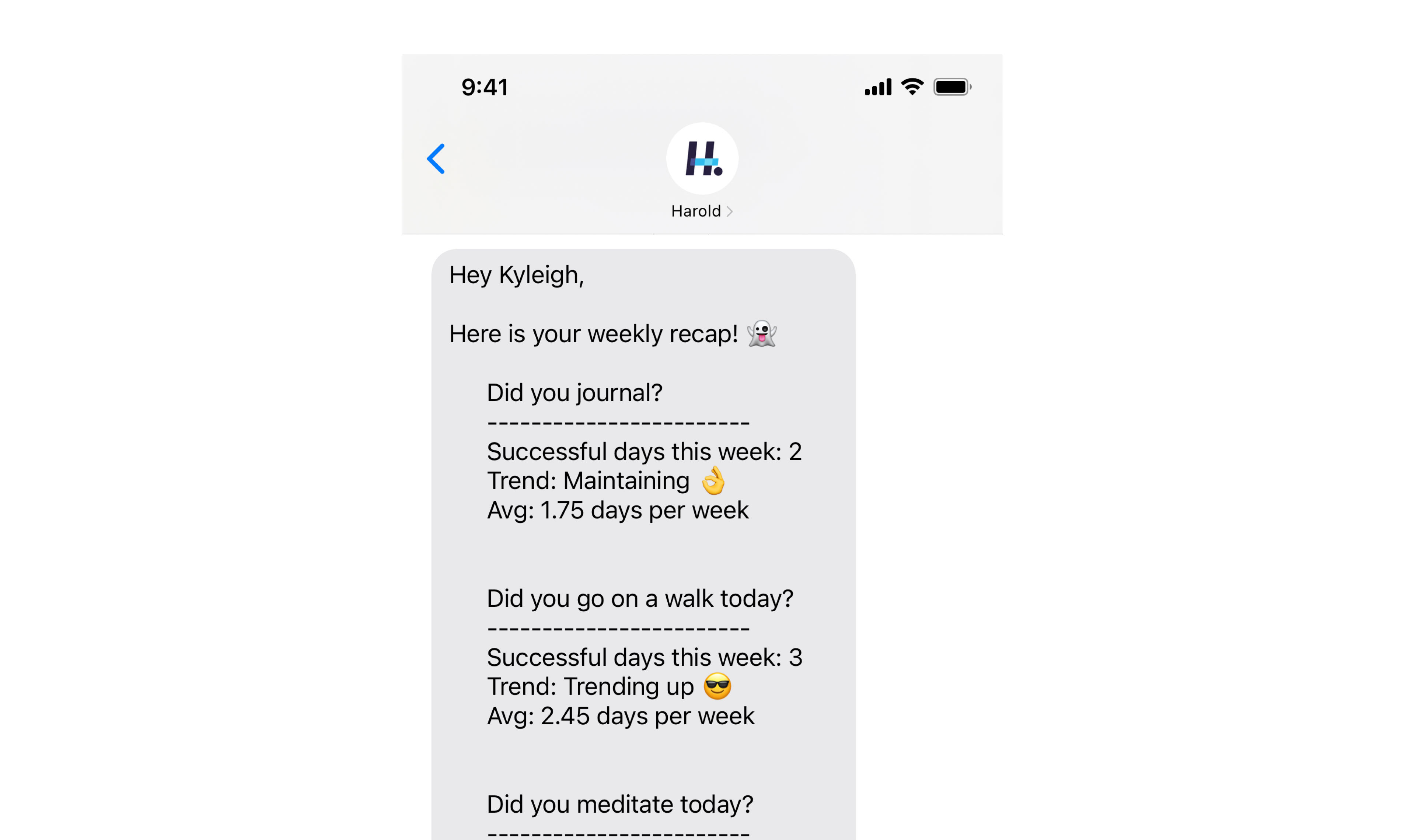
And there’s no need to beat yourself up if you miss a day.
No one’s perfect and your habit streak shouldn’t be either.
Harold will always be there to pick you up when you fall and help you get back on track.

*tears up*
Tracking habits is now easy and science-based
Whew! Who knew we could spend so long discussing something as simple as a habit tracker!
But the reality is that behavior change is extremely difficult.
Your habit tracker should be precision engineered with psychology and behavioral science so you can just focus on the hard work of building lasting change.
Fortunately, Harold will allow you to say goodbye to the frustrations of paper, solve the habit tracking paradox once and for all, and to quickly become your very best self.
Start your journey toward lasting change today.